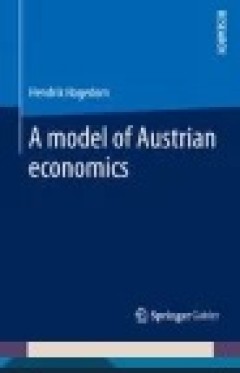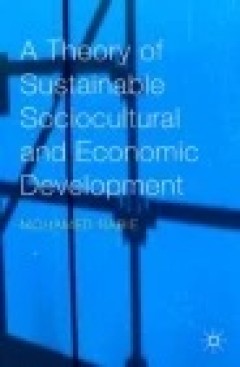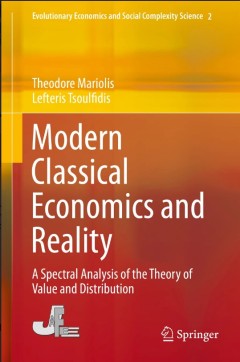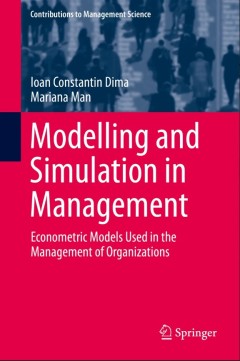Filter by

A model of Austrian economics
After the most recent financial crisis it has become clear that there exists a crisis also in economics as a science. The prevailing paradigms have failed to anticipate and to understand the financial crisis. New approaches are therefore needed. Of particular interest should be approaches that combine insights from those parts of economics that are largely neglected by the mainstream. Hendrik H…
- Edition
- Ed. 1
- ISBN/ISSN
- 978-3-658-07077-9
- Collation
- VIII, 104
- Series Title
- -
- Call Number
- 330 HAG m

A Theory of Sustainable Sociocultural and Economic Development
Why do some countries' economies struggle to develop, even when they are the focus of so much research and international funding? While recognizing that the obstacles facing poor nations are many and complex, Rabie proposes that the roots of most obstacles are sociocultural; thus, sociocultural transformation and economic restructuring can only be successful when treated as interconnected, mutu…
- Edition
- Ed. 1
- ISBN/ISSN
- 978-1-137-57952-2
- Collation
- XI, 243
- Series Title
- -
- Call Number
- 339 RAB t

The Theory of New Classical Macroeconomics A Positive Critique
This book examines new classical macroeconomics from a comparative and critical point of view that confronts the original texts and later comments as a first dimension of comparison. The second dimension appears in a historical context, since none of the new classical doctrines can be analyzed ignoring the parallelism and discrepancies with the theory of Keynes, Friedman or Phelps. Radicalism o…
- Edition
- -
- ISBN/ISSN
- 978-3-319-17578-2
- Collation
- -
- Series Title
- -
- Call Number
- -

The Theory of Extensive Form Games
This book treats extensive form game theory in full generality. It provides a framework that does not rely on any finiteness assumptions at all, yet covers the finite case. The presentation starts by identifying the appropriate concept of a game tree. This concept represents a synthesis of earlier approaches, including the graph-theoretical and the decision-theoretical ones. It then provides a …
- Edition
- -
- ISBN/ISSN
- 978-3-662-49944-3
- Collation
- -
- Series Title
- -
- Call Number
- -

The Short-Run Approach to Long-Run Equilibrium in Competitive Markets A Gene…
The authors present a new formal framework for finding the long-run competitive market equilibrium through short-run equilibria by exploiting the operating policies and plant valuations. This “short-run approach” develops ideas of Boiteux and Koopmans. Applied to the peak-load pricing of electricity generated by thermal, hydro and pumped-storage plants, it gives a sound and practical method…
- Edition
- -
- ISBN/ISSN
- 978-3-319-33398-4
- Collation
- -
- Series Title
- -
- Call Number
- -

Modern Classical Economics and Reality:A Spectral Analysis of the Theory of V…
This book presents an in-depth, novel, and mathematically rigorous treatment of the modern classical theory of value based on the spectral analysis of the price–profit–wage rate system. The classical theory is also subjected to empirical testing to show its logical consistency and explanatory content with respect to observed phenomena and key economic policy issues related to various multip…
- Edition
- 1
- ISBN/ISSN
- 978-4-431-55003-7
- Collation
- XI, 242
- Series Title
- Evolutionary Economics and Social Complexity Science
- Call Number
- -

Modelling and Simulation in Management:Econometric Models Used in the Managem…
This book is a comprehensive introduction of the reader into the simulation and modelling techniques and their application in the management of organisations. The book is rooted in the thorough understanding of systems theory applied to organisations and focuses on how this theory can apply to econometric models used in the management of organisations. The econometric models in this book employ…
- Edition
- 1
- ISBN/ISSN
- 978-3-319-16591-2
- Collation
- XXII, 523
- Series Title
- Contributions to Management Science
- Call Number
- -

Quantitative Models for Financial Risk
In recent decades, the fields of financial mathematics and financial risk evaluation have undergone explosive development. Financial mathematics, broadly defined, is a class of applied mathematics devoted to modelling and analysing financial markets, and to aiding the management of financial resources. We focus on the analysis of financial derivatives; in particular, options for pricing and …
- Edition
- -
- ISBN/ISSN
- -
- Collation
- -
- Series Title
- -
- Call Number
- 330
 Computer Science, Information & General Works
Computer Science, Information & General Works  Philosophy & Psychology
Philosophy & Psychology  Religion
Religion  Social Sciences
Social Sciences  Language
Language  Pure Science
Pure Science  Applied Sciences
Applied Sciences  Art & Recreation
Art & Recreation  Literature
Literature  History & Geography
History & Geography